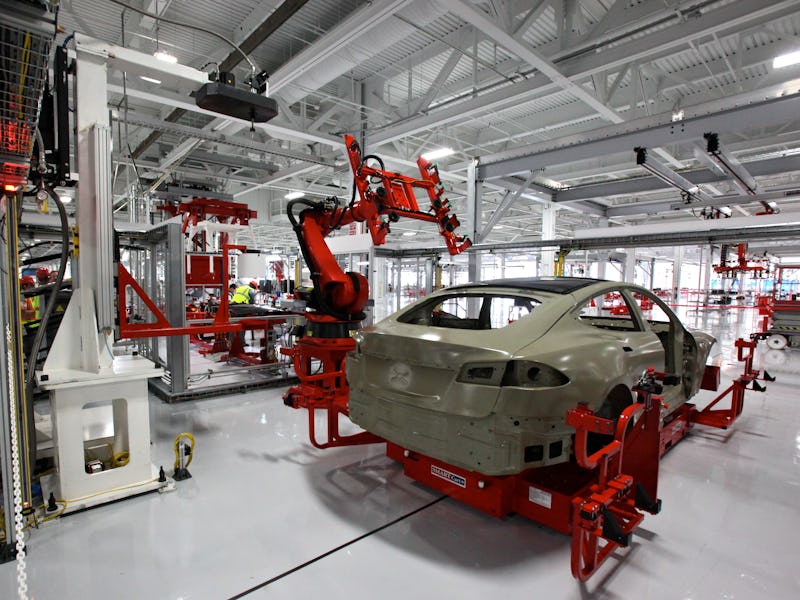Will Modern Luddites Attack Robots as the Automation Revolution Takes Hold?
When tools threaten the many, the many threaten tools.

It starts in the factories. On assembly lines in manufacturing plants, the number of robots is going up as the number of humans goes down. Automation feels inevitable, but it also strikes fear into the hearts of many — and not just union members. If we’re going to believe the headlines, we must assume future robots will take over profession after profession, one by one. But there’s a wrinkle (there’s always a wrinkle). People could stop them. The Luddites could resurface.
In the early 19th century, blue-collar English workers took it upon themselves to destroy the machinery that, they felt, threatened their livelihoods. They led a prolonged, violent campaign against textile machines. Their tactics included arson, general mayhem, and destruction. “We will never lay down Arms [till] The House of Commons passes an Act to put down all Machinery hurtful to Commonality,” the Luddites wrote. And that, in a sense, is the spirit of the Luddite movement: no compromise and no automation at the cost of jobs.
Ned Ludd lent the movement his graceless surname but never became a public figure. In fact, that’s a bit of an understatement: There’s a decent chance that he never even existed, that he was a sort of anti-technology Robin of Loxley. The story goes that, after being scolded at work, Ludd smashed his employer’s loom. It was an act of anger, but it became a political rubric.
Luddites.
Needless to say, the English were not pleased. In 1812, the government passed the Destruction of Stocking Frames, etc., Act, which enabled them to put to death any Luddite offender: “Every Offender being thereof lawfully convicted shall be adjudged guilty of Felony, and shall suffer Death.”
In more recent times, we’ve seen related philosophies emerge. Ecoterrorism, or, more lightly, “monkeywrenching,” often involves destroying machinery. Not dissimilarly, Anonymous, the hacking organization, attacks computer systems run by organizations it finds offensive. In both case, the activists destroy or disrupt things that they deem detrimental to the commonality. Automation arguably fits the bill. Though robots lack agency, their owners do not. The action taken by those with enough capital to engage in automation may endanger the livelihoods of those who have traditionally done manual work or even accounting. Machines, as an investment, exacerbate existing tensions between labor and management.
Whether or not another Luddite movement emerges seems largely a matter of where you’re standing. In China, with its population of 1.4 billion, automation will likely further separate the haves and the have-nots, which two classes already seem like they’re living in different centuries. Will further automation incite protests? It certainly could in the cities purposed for manufacturers. But things are different in places like Switzerland, where basic income laws are being debated (and advocated for by people dressed as robots). In places where there is a cultural discussion about how to make automation work for everyone, Luddism feels outdated and bullheaded. In places where there has been little dialogue, it feels like the loom smashing could begin at any moment.
As of this moment, it’s unclear which side of this divide America will lean toward. Despite Bernie Sanders’s popularity, basic income isn’t going to be legislated stateside any time soon. That said, minimum wages are creeping up. This is the phenomenon that triggered Wendy’s, the fast food chain, to invest in self-service kiosks. The math, for that company, seemed simple. But there are variables in the equation that we can’t yet solve for. Chief among them is how consumers will react to automation. It’s possible that the future of loom smashing is opting not to eat square burgers.
It’s important to remember that the Industrial Revolution built the modern middle class. And though that middle class is perpetually under siege in America, it still has extraordinary purchasing and political power when anything resembling a consensus forms. If that middle class, together with the lower class’s resurgent Luddism, protested or boycotted robotics-manufactured products, we could witness a change. Automation ceases to be helpful, after all, when companies lose their clients.